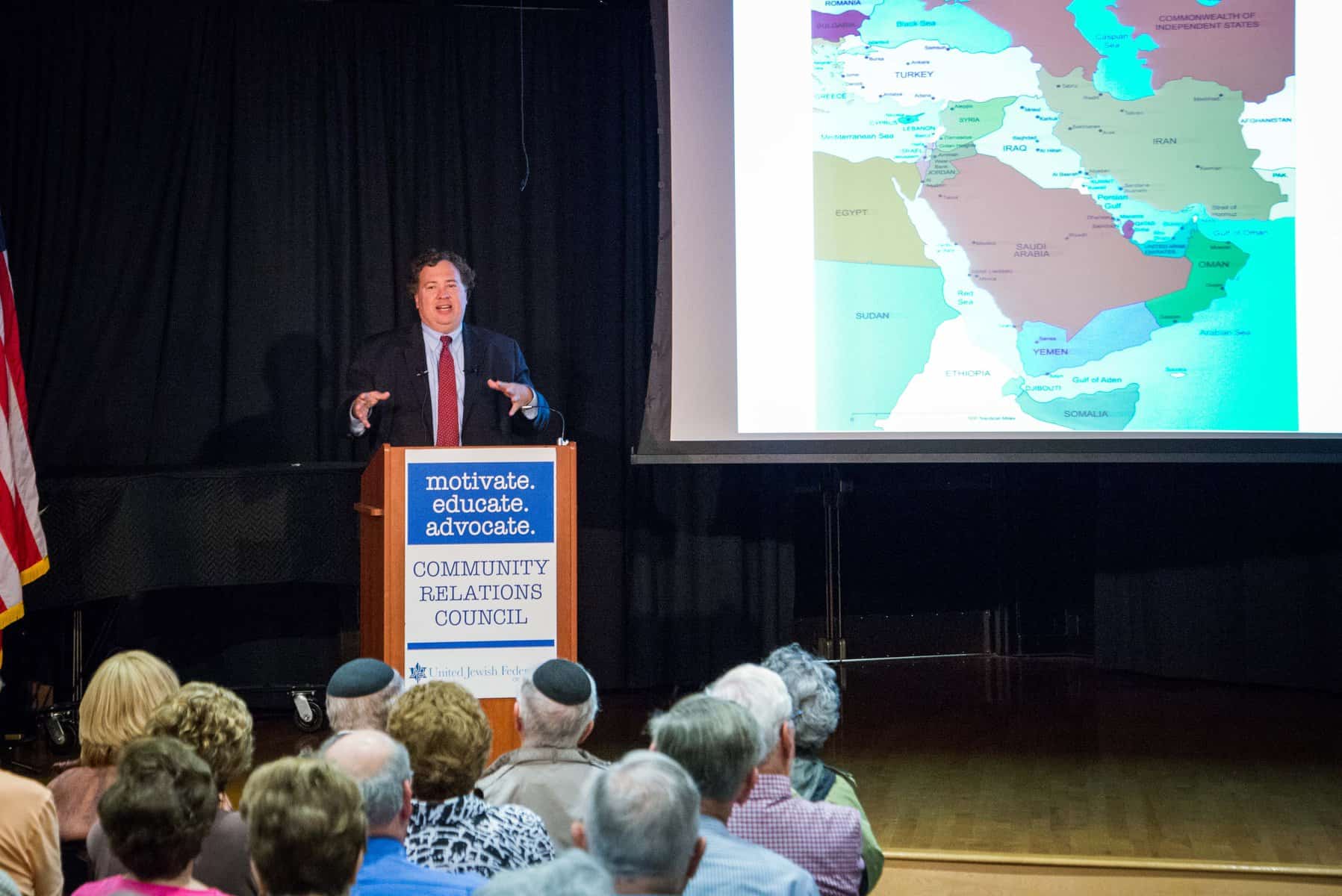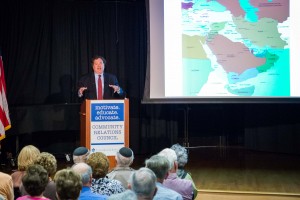David Makovsky uses sports metaphors when he speaks to audiences. Some football, but mostly baseball.
When it comes to uprisings, tensions, conflicts, and wars in the Middle East, Makovsky, an expert in that region of the world, says we’re only in the first, or at best, the second inning of that metaphorical game.
“This could go 11 innings, or may even be a double header,” says Makovsky. “There’s no end in sight.
“These are the most tumultuous times in the Middle East since the fall of the Ottoman Empire in 1917. We should be very aware of the historic moment we’re living in. And while I believe change will come, it is a long-term process that’s very hard, and we don’t know if it’s 20 years, 40 years, 50 years, that it will take for all of this to unfold.”
Makovsky visited the area on May 23 as the featured speaker in the Community Relations Council of the United Jewish Federation of Tidewater’s Israel Today Forum, in a program that was free and open to the community at the Simon Family Jewish Community Center. This second annual Forum was a partnership effort between the CRC and all local synagogues, Jewish agencies and organizations and many individuals and businesses.
An in-demand speaker, best-selling author and media commentator, Makovsky is the Washington Institute for Near East Policy’s Ziegler Distinguished Fellow and director of their Project on the Middle East Peace Process.
While in Tidewater, Makovsky also spoke to world military leaders at NATO’s Headquarters Supreme Allied Command Transformation in Norfolk, with the editorial board of The Virginian-Pilot, and to students, teachers, Virginia Beach City Schools administrative staff and school board member Beverly Anderson at Tallwood High School’s Global Studies and World Language Academy.
“In one day, about 500 people in Hampton Roads heard David speak about conflicts in the Middle East, his expert analysis of the many troubling situations there, and his confidence in Israel’s survival,” says Miriam Seeherman, outgoing chair of the CRC. “We are very fortunate that we had someone not only of his caliber, but with his experience, come and share information with us, and help us understand events that are happening right now in the Middle East.”
Makovsky flew directly to Tidewater from a Department of Defense funded National Defense University conference in Jordan and a visit to Israel. He brought with him an up-to-the-minute assessment and analysis of the current situations in Syria, Jordan, Israel, Egypt, Lebanon and Iran.
In Syria, Makovsky says, the two-yearold civil war has created a humanitarian tragedy that shows no signs of abating. The concern there, he says, is that the region won’t just fall apart, but that the country will disintegrate. It concerns Israel greatly, he says, if the country shatters like a glass that’s fallen on the ground.
Israel is staying out of the fight, though, says Makovsky, believing from past experiences that it cannot social engineer another country. However, he notes, they are helping in one area—and that’s health care.
“Israel is allowing its hospitals to be used,” he says. “They’re not even making it be known publicly, but anyone who is sick or injured can come, and they will be treated.”
Egypt, Makovsky says, is also problematic. Israel hopes the peace treaty it has with the country stays in place, but with the Muslim Brotherhood in leadership, there is a degree of uncertainty.
“Here’s the hope—the best case scenario there is that the more radical elements in Egypt will have so overplayed their hand that they’ll no longer be seen as leaders. They can’t feed their people, they have no vision for the country. So radicalism will be discredited and the country will have to choose a more moderate view.” But, he warns, “The moderates will then have to follow through.”
Iran, too, Makovsky says, is another difficult issue. The threat of the country having nuclear weaponry is ever present, and that country continues to send weapons to Syria and Lebanon that can cause serious loss of life and property in Israel.
As for the prospect of a twostate solution with Israel and Palestine? Doubtful right now, says Makovsky. Instead of making that the goal, he says Israel should focus more modestly on borders, security and practical issues.
“If we focus on those things, we can take the ball 70 yards. So we don’t score at 99 yards, but we’re within field goal range. And that’s the best we can hope for.”
While the challenges are great, Makovsky told his audiences, it is important to remember the amazing opportunities in Israel and the achievements of the Israeli people.
“Despite all of its enemies and its wars, this is a country that has built a thriving democracy. So it is important that while we talk about discerning the dangers, we don’t lose sight of seizing opportunities and making sure that we have a balance, equilibrium, between the opportunities and the threats.”
Makovsky concluded his presentation at the JCC by adamantly stating his admiration for Israel, and assurances that she will survive.
“People ask me how can I sleep at night when I know so much,” Makovsky says. “I like to think of it this way: I’m a long-term optimist. Whenever we think we’re challenged by all of these fanatical people who want to kill themselves and take Israelis with them, I keep thinking of the resilience of the people of Israeli. That Israel’s will to live is greater than its enemies’ will to die.
“And so,” he adds emphatically,” in the most literal sense, Am Yisrael Chai, the Jewish people live.”
To find out more about the Community Relations Council of the United Jewish Federation of Tidewater, to see upcoming programs and a library of resources, visit www.jewishva.org/crc. For more photos from this event, “Like” JewishNewsVa on Facebook.
article and photographs by Laine Mednick Rutherford


